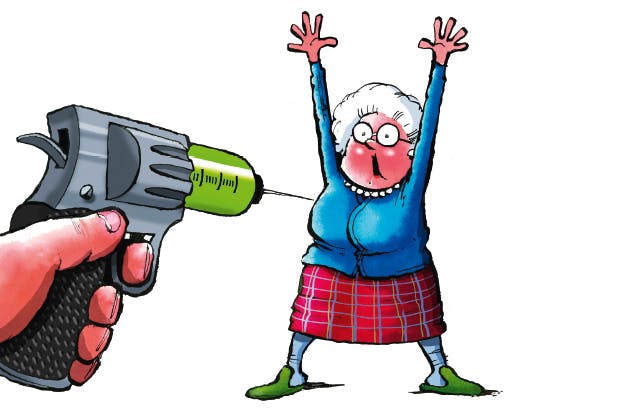The Royal College of Physicians will soon begin yet another consultation with its members on the subject of ‘assisted dying’. The college is opposed to legalisation, but a minority are unhappy with this. They know there is no chance of persuading a majority to support such practices. So they are pressing for the college to declare itself neutral. Whether the law should be changed, they say, is a matter for society rather than for the medical profession.
In one sense they are right. Whether the law should be changed to permit people to be supplied with lethal drugs to take their own lives is a social rather than a medical matter. Official reports from Oregon in the United States, where assisted dying is legal, show that the main reasons why terminally ill people seek lethal drugs are often personal or social rather than clinical. They include not being able to enjoy life as before, wanting to decide the time of their death and – more worryingly – feeling that they are a burden on others.
But the question surely arises: in that case, why should assisted suicide (which is what ‘assisted dying’ is in law) be doctor-assisted suicide? The question is all the more pertinent as the majority of British doctors, and particularly those of us who specialise in treating terminally ill patients, are opposed to such legislation. Even some who say they would support a change in the law want such practices to be outside medicine.
Yes, doctors have skills needed to diagnose terminal illness and to offer a prognosis – though the latter is often little more than guesswork. But the main criteria activists who want a change in the law propose – for example, that there should be no pressure in the background or that a request for lethal drugs should stem from a long-settled wish – are beyond the knowledge of most doctors. This is particularly the case in these days of big GP practices and infrequent home visits. In any case, with most doctors unwilling to participate in ‘assisted dying’, the result – as has been seen clearly in Oregon – is what’s known as ‘doctor shopping’, where those seeking lethal drugs shop around and end up being assessed by doctors who have never met them before and know nothing of them beyond their case notes.
The ‘assisted dying’ question is essentially about balancing giving rights to some against giving protection to other, more vulnerable, people. Social decisions of this nature are for the courts – and, given the gravity of what is involved in this case, for the High Court – not for the consulting room or hospital ward. If doctors were to have a role at all in any future ‘assisted dying’ programme, it should be as expert witnesses on matters strictly within their professional competence, not as decision-makers. Conversely, if the activists want doctors to do ‘assisted dying’, they cannot insist the medical profession should stand aside and be neutral on whether it should be legalised. As the saying goes, no decision about me without me.
Which brings us back to the Royal College of Physicians and its latest consultation. Activists have failed to get what they wanted before, so they have persuaded the college’s council to change the rules this time. Whereas previously the college adopted the view favoured by the majority of its members – that it should oppose legalisation – it now says it will adopt a position of neutrality unless at least 60 per cent say it should oppose or support legalisation. Yet in the last consultation only 31 per cent wanted the college to have a neutral position. This device is as arbitrary and nonsensical as it is politically-motivated. It reverses the burden of proof and sets the bar at a level which no group – support, oppose or don’t know – could possibly clear. The aim of activists is, of course, to present the resulting ‘neutrality’ to Parliament and the public as ‘doctors drop their opposition to assisted dying’.
But medical opinion is not shifting on this question. The last survey of its members by the Association for Palliative Medicine – the branch of medicine that specialises in care of the dying – found that 82 per cent were opposed to legalisation and that 89 per cent would be unwilling to participate in such acts.
This is a question that goes to the heart of clinical practice. For the Royal College of Physicians to tell the world that it has no position on the question of whether doctors should be licensed to aid and abet the suicides of patients is nothing short of astonishing and raises serious questions about the college’s governance. The college should reflect on its role as a medical professional body and not allow itself to be manipulated into playing politics.
Dr Amy Proffitt is consultant in palliative medicine at Barts Hospital






Comments